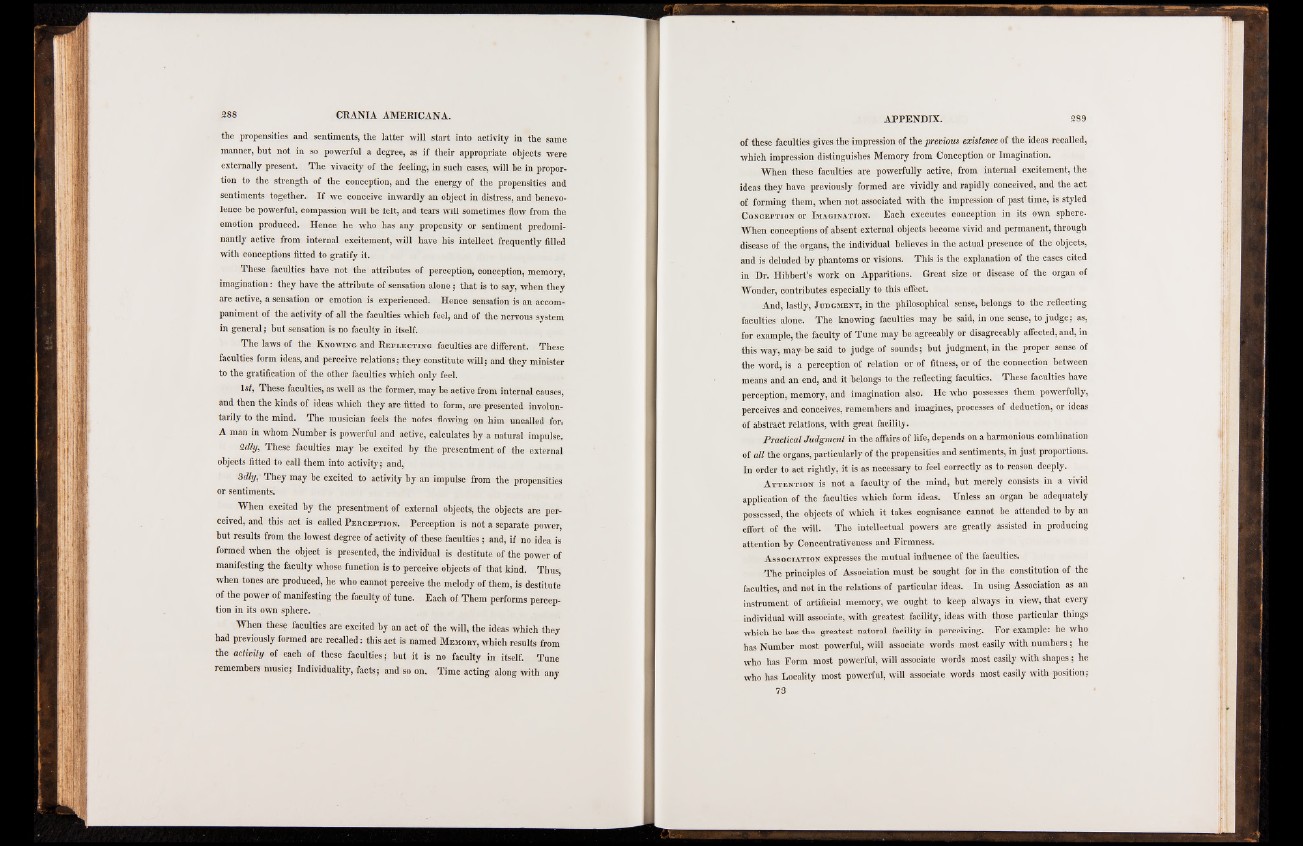
the propensities and sentiments, the latter will start into activity in the same
manner, but not in so powerful a degree, as if their appropriate objects were
externally present. The vivacity of the feeling, in such cases, will be in proportion
to the strength of the conception, and the energy of the propensities and
sentiments together. If we conceive inwardly an object in distress, and benevolence
be powerful, compassion will be felt, and tears will sometimes flow from the
emotion produced. Hence he who has any propensity or sentiment predominantly
active from internal excitement, will have his intellect frequently filled
with conceptions fitted to gratify it.
These faculties have not the attributes of perception, conception, memory,
imagination: they have the attribute of sensation alone; that is to say, when they
are active, a sensation or emotion is experienced. Hence sensation is an accompaniment
of the activity of all the faculties which feel, and of the nervous system
in general: but sensation is no faculty in itself.
The laws of the Knowing and Reflecting faculties are different. These
faculties form ideas, and perceive relations; they constitute will; and they minister
to the gratification of the other faculties which only feel.
1st, These faculties, as well as the former, may be active from internal causes,
and then the- hinds of ideas which they are fitted to form, are presented involuntarily
to the mind. The musician feels the notes flowing on him uncalled for.
A man in whom Number is powerful and active, calculates by a natural impulse.
2dly, These faculties may be excited by the presentment of the external
objects fitted to call them into activity; and,
3dly,' They may be excited to activity by an impulse from the propensities
or sentiments.
When excited by the presentment of external objects, the objects are perceived,
and this act is called P erception. Perception is not a separate power,
but results from the lowest degree of activity of these faculties; and, if no idea is
formed when the object is presented, the individual is destitute of the power of
manifesting the faculty whose function is to perceive objects of that kind. Thus,
when tones are produced, he who cannot perceive the melody of them, is destitute
of the power of manifesting the faculty of tune. Each of Them performs perception
in its own sphere. .
When these faculties are excited by an act of the will, the ideas which they
had previously formed are recalled: this act is named Memory, which results from
the activity of each of these faculties;: but it is no faculty in itself. Tune
remembers music; Individuality, facts; and so on. Time acting along with any
of these faculties gives the impression of the previous existence of the ideas recalled,
which impression distinguishes Memory from Conception or Imagination.
When these faculties are powerfully active, from internal excitement, the
ideas they have previously formed are vividly and rapidly conceived, and the act
of forming them, when not associated with the impression of past time, is styled
Conception or Imagination. Each executes conception in its own sphere.
When conceptions of absent external objects become vivid and permanent, through
disease of the organs, the individual believes in the actual presence of the objects,
and is deluded by phantoms or visions. This is the explanation of the cases cited
in Dr. Hibbert’s work on Apparitions. Great size or disease of the organ of
Wonder, contributes especially to this effect.
And, lastly, J udgment, in the philosophical sense, belongs to the reflecting
faculties alone. The knowing faculties may be said, in one sense, to judge; as,
for example, the faculty of Tune may be agreeably or disagreeably affected, and, in
this way, may-be said to judge of sounds; but judgment; in the proper sense of
the word, is a perception of relation or of fitness, or of the connection between
means and an end, and it belongs to the reflecting faculties. These faculties have
perception, memory, and imagination also. He who possesses them powerfully,
perceives and conceives, remembers and imagines, processes of deduction, or ideas
of abstract relations, with great facility.
Practical Judgment in the affairs of life, depends on a harmonious combination
of all the organs, particularly of the propensities and sentiments, in just proportions.
In order to act rightly, it is as necessary to feel correctly as to reason deeply.
Attention is not a faculty of the mind, but merely consists in a vivid
application of the faculties which form ideas. Unless an organ be adequately
possessed, the objects of which it takes cognisance cannot be attended to by an
effort of the will. The intellectual powers are greatly assisted in producing
attention by Concentrativeness and Firmness.
A ssociation expresses the mutual influence of the faculties.
The principles of Association must be sought for in the constitution of the
faculties, and not in the relations of particular ideas. In using Association as an
instrument of artificial memory, we ought to keep always in view, that every
individual will associate, with greatest facility, ideas with those particular things
which he has the greatest natural facility in perceiving. For example: he who
has Number most powerful, will associate words most easily with numbers; he
who has Form most powerful, will associate words most easily with shapes; he
who has Locality most powerful, will associate words most easily with position;